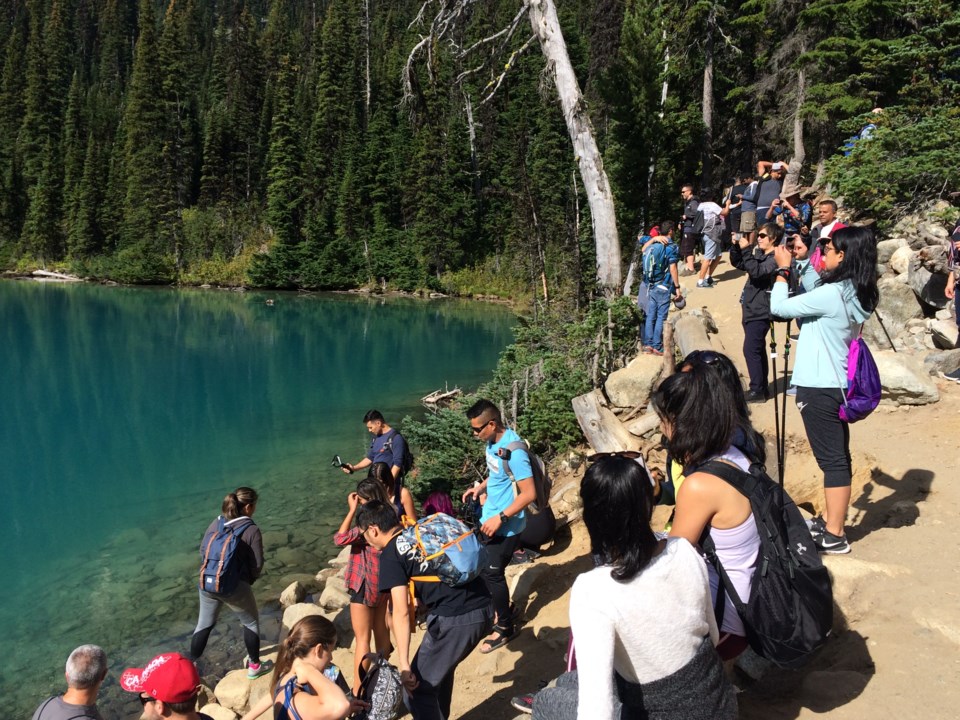A steady flow of traffic up and down the Sea to Sky highway, parking lots overflowing with visitors, lakes increasingly littered with rubbish—these are just a few of the hallmarks of overtourism, and a growing concern of the Squamish-Lillooet Regional District (SLRD) and its member municipalities.
To help the region balance the demands of increased visitation and respect for the natural environment, the Sea to Sky Destination Management Council, an offshoot of provincial tourism marketing organization Destination BC, launched the Don’t Love It to Death campaign in 2022.
On May 24, the SLRD board received a report on the campaign from Destination BC senior project advisor Jonathan Heerema and consultant Amber Turnau, highlighting the marketing campaign’s progress and success over the last year.
“We’ve worked with [MMGY] Origin, a Whistler-based creative agency, and they helped us develop the content and the concept called ‘Don’t Love it to Death.’ It drives home the message that increased recreation and travel is putting a strain on the environment, communities, residents and the guest experience and infrastructure in the Sea to Sky and many areas throughout the province,” Heerema said.
“We want residents and visitors to think about the implications of their behaviours, conduct themselves respectfully, and realize that they’re responsible for the protection of the environment, communities, and wildlife in the process.”
The Don’t Love It to Death campaign incorporates various outreach tools, including billboards on Highway 99, posters on BC Ferries, social media posts and videos, and an outdoor ambassador program to raise awareness of the impacts of visitation on the environment.
Over the last year, the program has highlighted impacts on waterways, and how to travel in the region without leaving behind problems, with a few social media videos garnering tens of thousands of views from people across the region.
“We’re loving some places to death, and a change in our behaviour is required,” Heerema said.
In 2019, more than 190,000 sightseers came through Joffre Lakes Provincial Park—a 222-per-cent increase over 2010. To address the rise in popularity, the provincial government implemented a free day-use permit system for better management.
It’s not just provincial parks feeling the strain. The Resort Municipality of Whistler (RMOW) experienced a significant upsurge in tourists to its four destination parks over the past few years. In 2022, visitation to Whistler’s parks rose by 35 per cent over the previous year, which itself was 77 per cent higher than in 2019.
Lillooet Mayor Laurie Hopfl said the SLRD or provincial government should consider implementing a payment system for the some of the region’s busy parks.
“I think that we need to look at a Fee for Service, so to speak … We’re missing so much revenue that we could generate for clean-up and jobs and just that whole pay-to-play,” Hopfl said.
“I think the whole corridor needs help when it comes to garbage and littering and the whole ‘love it to death’ issue, but I still think it goes back to … people would maybe have a little bit more respect if they had to pay for the ability to be able to park there and use our parks and playgrounds.”
Overall, Whistler Mayor Jack Crompton is encouraged by the progress made on the public information campaign, seeing it as one of many steps in the battle to manage growing tourism in the region.
“I remember when we first had the conversations at the destination development strategy table about pivoting a little bit away from marketing the region towards management and care for the region, and I think this is a really important shift in focus,” Crompton said. “I’m hopeful that’s the first step, and there’s many more to follow, which is exciting because I think it means we’re doing things differently than we’ve done in the past, and this is a tremendous start.”




